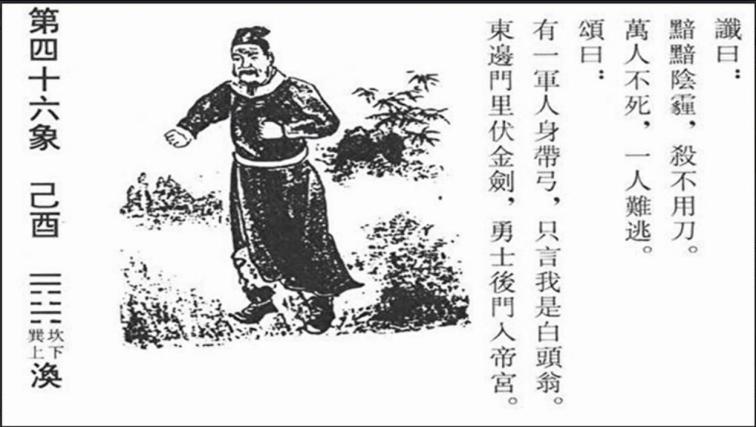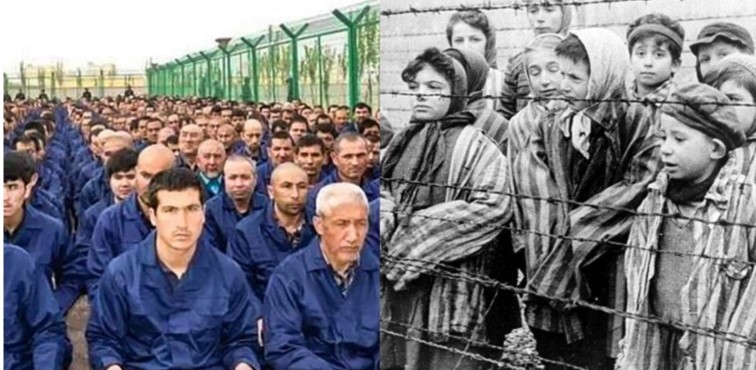On April 19, 2023, (from left) Wang Yi, Xi Jinping, and Qin Gang met with the visiting President of the Gabonese Republic (not pictured) in Beijing. (Ken Ishii-Pool/Getty Images)
[People News] Among Beijing’s top officials, Chinese Foreign Minister Wang Yi is widely regarded as the one who understands Xi Jinping the best. Wang Yi is known for “speaking absolute nonsense with a straight face” on the international stage. According to an article by Radio France Internationale (RFI), what Wang Yi says is exactly what Xi Jinping thinks.
On July 13, Wang Yi met with Russian Foreign Minister Sergey Lavrov in Beijing. Wang emphasised that China-Russia relations are currently “the most stable, most mature, and most strategically valuable major-power relationship in the world.” The RFI article quipped that Wang used “three superlatives” to say what Xi wanted to say—perhaps even more absolutely than Xi himself would have said it.
Two days later, on July 15, Xi Jinping met with Lavrov and stated that both sides should “implement the important consensus reached with President Putin” and “strengthen mutual support in multilateral forums.” According to Moscow, Xi and Lavrov also discussed the arrangements for Putin’s upcoming visit to China.
The article notes that Lavrov’s relationship with Putin mirrors Wang Yi’s relationship with Xi, and that Xi's meeting with Lavrov is essentially sending a signal to Putin.
Xi Jinping is so deeply attached to and infatuated with Russia that he once lamented that “not a single real man stood up” to save the Soviet Union from collapse. Xi publicly declared that Putin is “my best friend,” and just 20 days before Putin launched the invasion of Ukraine, Xi pledged that China-Russia cooperation has no limits. Even after Russia became a global pariah, Xi’s deep affection for Russia hasn’t wavered—not even when Chinese-made bombs used by Russia in Ukraine left shrapnel on China’s own consulate.
In May 2023, just days after Putin was indicted by the International Criminal Court, Xi personally visited the Kremlin to show his support—a move that stunned Europe.
As Xi Jinping’s top diplomatic spokesperson, Wang Yi has clearly understood and aligned himself with Xi’s intentions. That’s why he bluntly told the EU, “Beijing does not want to see Russia fail in Ukraine,” a statement that shocked European leaders.
Wang’s diplomatic “slip” chilled EU sentiment on the Ukraine issue, but the silver lining was that it sharpened the EU’s clarity about Beijing’s stance.
Just a week before this “slip,” on June 25, Wang Yi gave a speech at a diplomatic luncheon held by the Polish Embassy in China, where he declared: “We will absolutely not allow the Taiwan region to be separated from China. What’s particularly worrying now is the Democratic Progressive Party (DPP), the ruling party in Taiwan. It is trying every means to pursue independence, and that is extremely dangerous.” Wang labelled the DPP as a “source of lies and danger for Taiwan independence.”
Wu Yijun, founder of Jushi Think Tank, wrote in an article published on July 19 in Up Media that the CCP has always viewed democratic Taiwan as part of its territory, and even labelled Taiwanese President Lai Ching-te as a “dangerous separatist,” completely ignoring the fact that the People’s Republic of China has never governed Taiwan.
Wu stated that by labelling the DPP as a source of lies and danger, Wang Yi essentially smeared Taiwan’s democratically elected government and denied its democratic legitimacy. This reflects an open hostility toward democratic systems, and Wang’s hardline rhetoric only worsens tensions across the Taiwan Strait, deepening international suspicions about the CCP.
Wu described Wang’s statements as “nonsense spoken with a straight face,” saying they reflect the Xi Jinping regime’s hardline posture, full of political manipulation and broken logic, aimed solely at serving the CCP’s ambitions for control.
Under the CCP’s unwritten rule of “seven up, eight down” (officials may remain in power at age 67 but must retire at 68), Wang Yi broke the norm by being promoted to the CCP Politburo at age 69 during the 20th Party Congress. According to RFI, this exception was made because he deeply grasped and embodied Xi Jinping’s “wolf warrior” diplomacy. Though his tough tone severely damaged Beijing’s international image, Xi appreciated his loyalty, promoting him to be China’s top diplomat.
So when the world sees Wang Yi speaking nonsense with conviction, what he’s really doing is expressing Xi Jinping’s innermost thoughts.
Wang Yi—the person who understands Xi Jinping best—has never said anything truly “nonsensical.”
(Originally published by People News)











News magazine bootstrap themes!
I like this themes, fast loading and look profesional
Thank you Carlos!
You're welcome!
Please support me with give positive rating!
Yes Sure!